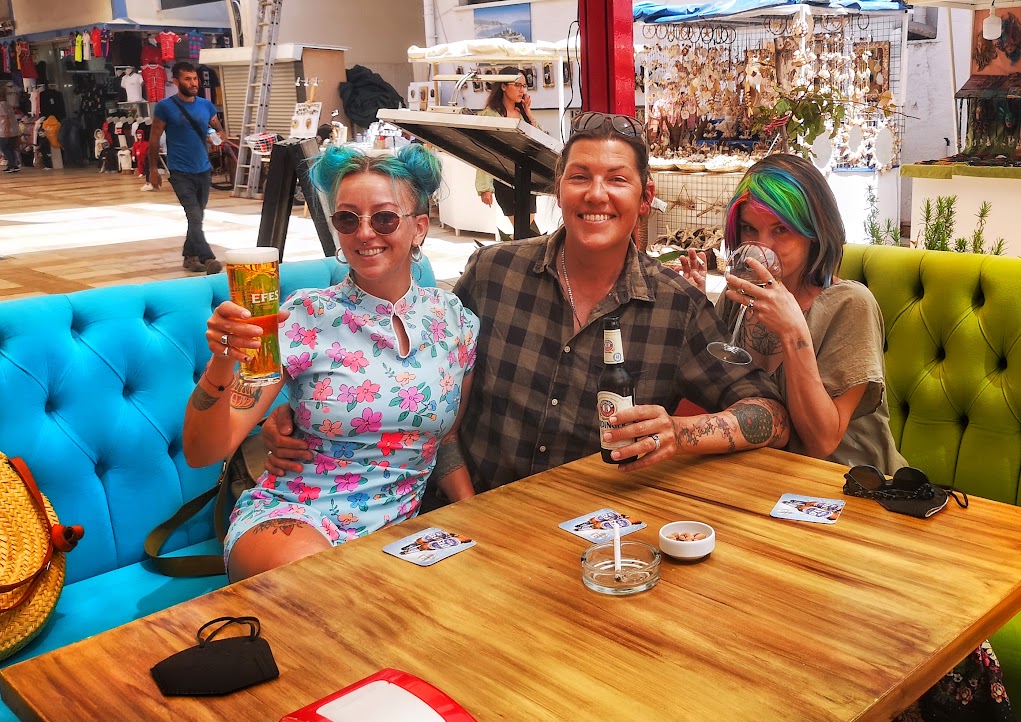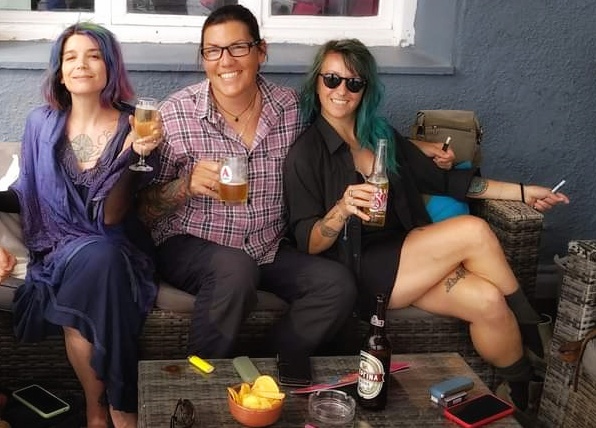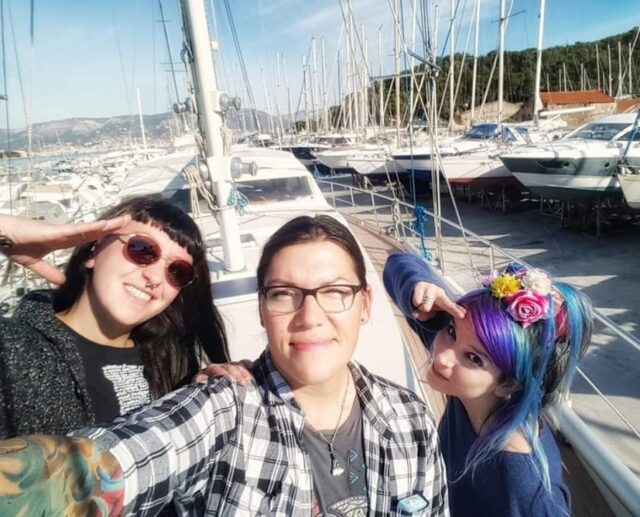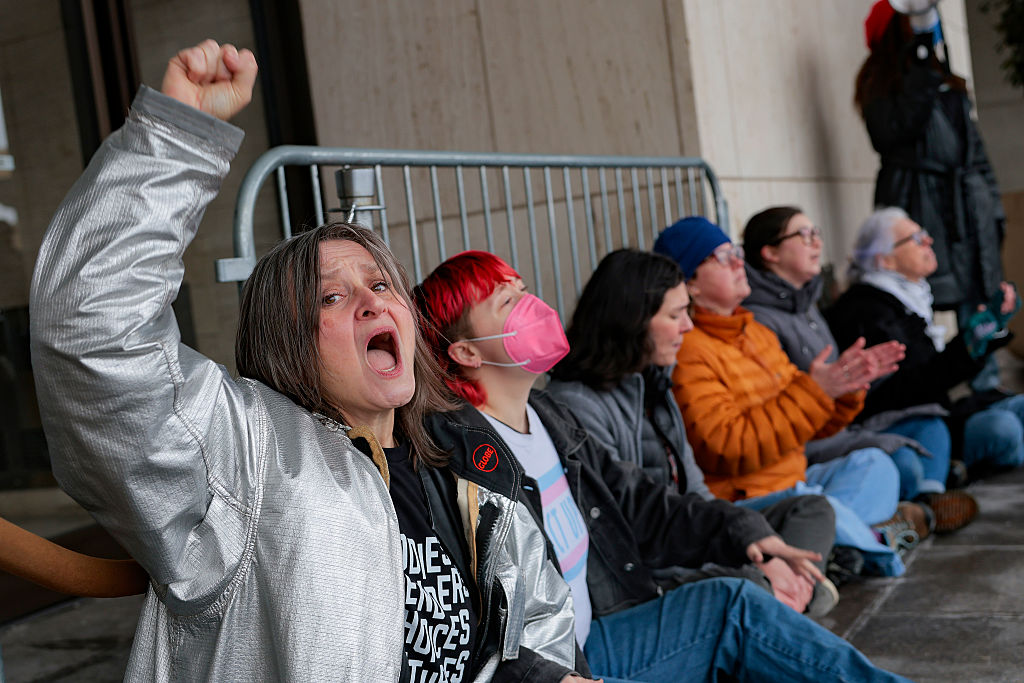Poly Sapphic Nomads Find Their Home On The Island Of Lesbos

My Big Fat Polyamorous Sapphic Greek (unofficial) Wedding.
Queer women have been making their way to Eressos, a village on the Greek island of Lesvos, for over half a century. As the birthplace of Sappho, the village has become a place of pilgrimage for Sapphics; some holiday for a few weeks, others settle for a few decades. All are infatuated by the sense of safety, community and the breathtaking combination of sand, sea and spotless blue skies.
The arrival of the Rainbow’s Tribe, a polyamorous throuple – though they prefer ‘family’ to ‘throuple’ – Elizabeth, Cristina and Davi, sent tremors of excitement through Sappho’s hometown. They’d been living on a sailboat for five years and planned to make their way around the world. From the moment they docked, they’ve become an unmissable presence here – not because they waltz down the promenade hand-in-hand-in-hand – but because they bring a necessary dose of vibrancy and queerness to the community. They’re writers, academics and translators, each adorned in tattoos, with hair dyed every shade of turquoise and blue found in the Aegean Sea. It’s unclear who’s happier to have found the other– Eressos or the Rainbow’s Tribe.

The trio were originally drawn to Lesvos for nautical reasons; the capital Mytilene has a protected port (and a good price). As they sailed to the island, they listened to a podcast, I’ll Never be Alone Anymore: The Story of the Skala Eressos Lesbian Community. “All of us had tears in our eyes,” says Davi, a 46-year-old transwoman born in Libya, “like what the fuck is this place? Of course we knew Sappho in the broadest terms, but we had no idea that there was a living community here.”
They landed in September last year, when the International Women’s Festival was at its zenith and there were queer women as far as the eye could see. Though they’re seasoned travelers – with a list of countries of origin and places of residence that would dwarf the departure board at JFK airport – they were bowled over by Eressos. It was “unlike anywhere they’d experienced.”
“We could live in another beautiful village in Greece, except there, you go to the platia and in the café there’ll be 40 mustached old guys playing dominos,” says Davi, “… what the hell am I gonna do there?” she says, gesturing toward herself. She’s tall, wearing a buttoned down Hawaiian shirt and sporting a brown ponytail. When a “lucky strike,” as she calls it, brought sufficient money for Davi’s transition, the first thing she bought was a vagina, the next was a high-powered motorcycle, she says. For safety reasons, she decided to forgo top surgery; having lived and traveled through every continent – often by boat or bike – silicon breasts didn’t seem like a sensible aesthetic for her life on the road. Davi is often misgendered, “I don’t make any effort to correct them,” she says, “unless they’re my friends, it’s just easier that way.”
In less than a year, the Rainbow’s Tribe have fully rooted their lives into Eressian soil. They now own a plot of land (it includes a house, a creative studio and two apartments – future homes for their parents come retirement), and have since realized that the title of the podcast, I’ll Never be Alone Anymore, was more of a threat.
“No matter what you do, you go outside and you have ten people saying hello to you here,” says Davi.
“Kalimera, kalimera,” Elizabeth chirps like a parrot.
“You can NEVER be alone again,” says Cristina
“It was a goddamn warning,” exclaims Davi, “but of course that’s why we fell in love with it.”
The lovebirds have palpable chemistry, as we sit in a café on the seashore, they seamlessly bounce jokes and ideas off each other like they’re playing bat and ball in the sand. Their love story began with Davi and Elizabeth almost two decades ago at a writing competition in Colorado. Davi was the judge, Elizabeth, the winner. Young love blossomed for several months, until a car crash left Elizabeth in a coma, and Davi parked outside the hospital in a Volkswagen bus, waiting for her beloved to return.
“I woke up and the person with whom I was in love was there,” says Elizabeth, after ten days in “another dimension.” At 38 years old, she is the youngest and most introverted of the trio, or the most “socially awkward” as she frequently declares. She’s slender, with a Lord of the Rings tattoo etched across her chest like a breastplate. Elizabeth speaks in a whimsical manner, child-like at times, though she’s often making profound references to Greek mythology, Susan Sontag or, most likely, J.R.R. Tolkein. The pair were inseparable from then on; Elizabeth finished university while relearning to walk, Davi went to Thailand to complete her SRS surgery, they married in Myanmar, and after a five-year stint in Hungary, moved to Italy.
It was a warm evening in Florence, seven years ago when they were at one of their favorite nightclubs that they met Cristina. Then 32 years old, Cristina was working as a high-end hotel concierge. Davi describes her as one of the most socially well-connected people in central Italy. “Anything you need in Florence, tell her, to this day, she’ll take care of it,” adds Davi. Cristina spotted Davi across the dance floor, downed a shot of rum, zhuzhed up her pin-up bangs and torpedoed through the crowd.

Conversation roared in the smoking area, as rum and nicotine fused through their bloodstreams, then Davi uttered the fateful words, “I have to introduce you to my wife.”
Cristina took two steps back, “I’m not that kind of person,” she professed, “it’s been great chatting, but I have to go.”
To which Davi dropped a word Cristina had never heard before: polyamory. Davi spoke of their open marriage, their agreement to be with other people if they desire. Cristina and Elizabeth met, they too hit it off, and a new constellation was born on the streets of Florence.
Davi and Elizabeth’s open relationship closed when Cristina joined their partnership. People make two common assumptions about their love, the first is that they must be “down to fuck,” says Davi, because there are three, which just isn’t the case. The second is the notion that some piece of the puzzle was missing before Cristina fell into their love’s embrace.

“I’ve never felt that anything is missing,” says Davi, “nobody is lacking anything, we’re all just three 100% different people and the relationships are different in all directions.” Davi proceeds to give the example of parenthood, “you don’t have a second kid because the first one is lacking,” she says, “it doesn’t work like that.”
All three agree that a relationship in any form is all about the quality of communication and integrity of your agreements – this is the case whether there are two, three or seven people involved. “It’s not easier or harder,” says Cristina, “there’s just work to be done on a relationship, and at some point you accept each other’s differences or similarities… [for us] it’s just that you have to talk to two people instead of one.”
“Logistically there are things that are easier with three people,” adds Davi, “just because you have another person to do stuff with.” Cristina’s passion for laundry is matched by Davi’s passion for cooking, while Elizabeth has been busy completing her Masters in History, which she claims made her “resoundingly useless for three years,” – to the swift rebuttal of the other two.
Legally, Davi and Elizabeth are married while Cristina can’t officially be any of their wives. They still refer to each other as “wife,” but cannot sign papers to protect those rights.
“Here in Eressos, I would like us to do some kind of a hand-fasting ceremony with Cristina,” says Davi
“Oh really,” says, Cristina, thrown off-guard with a smile she can’t hide, “what is that movie?”, she says.
“My Big Fat Greek Wedding,” says Davi.
“Yes, but ceremony…” says Cristina.
“My Big Fat Greek Hand-Fasting!” says Elizabeth.
Each twirls the ice in their Freddo Cappuccino as the scorching sun sprinkles diamonds across the sea. They are thoroughly enjoying being interviewed; constantly making each other laugh and visibly lighting up as the others speak their truth. “They’re my trophies,” says Cristina, “they are the best people that I could ever find.”
“With these two, I don’t have jealousy,” says Davi, off-the-bat, “it’s an overused word but compersion, compersion, compersion.” A word first coined by the San Franciscan Kerista Commune, compersion is defined as ‘the opposite of jealously, positive feelings about your partner’s other intimacies.’
“If they were my friends… I would be happy if they go out and have a drink together… why does it change with people you love more than a friend?” she asks.
“I think that jealousy is a form of insecurity,” says Cristina, “and if I said that I’m a completely confident person in all the situations I would be a humongous liar.”
“Insecurity comes up for everyone,” concurs Elizabeth, “it’s not like you’re bad at polyamory if you get insecure… it’s just something that has to get talked out and worked through.”
Davi then concurs with Critsina and Elizabeth, “when you put it that way…” she says. There is great care in the way they communicate, each listens and sews the input of the others into the tapestry of their understanding. The Rainbow’s Tribe order a second round of coffees and a “barrel of water,” the morning breaks and the island breeze becomes heated like a hair dryer. As a local waiter delivers the coffee, “who will be first,” he says, “gentleman, gentleman,” he declares as he places the first coffee in front of Davi.
“Something like that,” Davi says softly across the table, referring to her common misgendering. When navigating the world as a queer-poly couple, questions of safety inevitably arise.
“The trans is much more of an issue, than the poly thing,” says Davi. “We can walk down the street holding hands together, every time we come and go we all give each other a kiss on the mouth, we’ve never had a single issue.”
When they were docked in Rhodes, a mariner was being very standoffish to the trio until he spoke to Davi:
“So, who’s the one with purple hair to you?” asked the mariner.
“She’s my wife,” Davi replied.
“Okay, and what about the one with the green hair?”
“That’s my wife.”
He gazed at Davi for five emotionless seconds before raising his fist for a bump. “Nice,” he says, and was nothing but sweet from that point on.
“I don’t know how he would have been if I’d added that I’m trans… that part can be the hard sell for otherwise pleasant, nice people.”
In Eressos there aren’t many trans people and though the Rainbow’s Tribe have uncovered a few piercing thorns of latent transphobia, Davi insists, “98% of people have been so fucking welcoming.”
Overwhelmingly, there is a sense of safety in this little village – both emotional and physical – that the trio hadn’t experienced anywhere else in the world. It is that feeling that has led these globe-trotting nomads to declare themselves “Eressian.” This is a place that contains the most extraordinary lives, and if people and love stories like the Rainbow’s Tribes keep landing on these shores, Eressos will continue to be a place of safety, expansion and homecoming for many generations of Sapphics.












